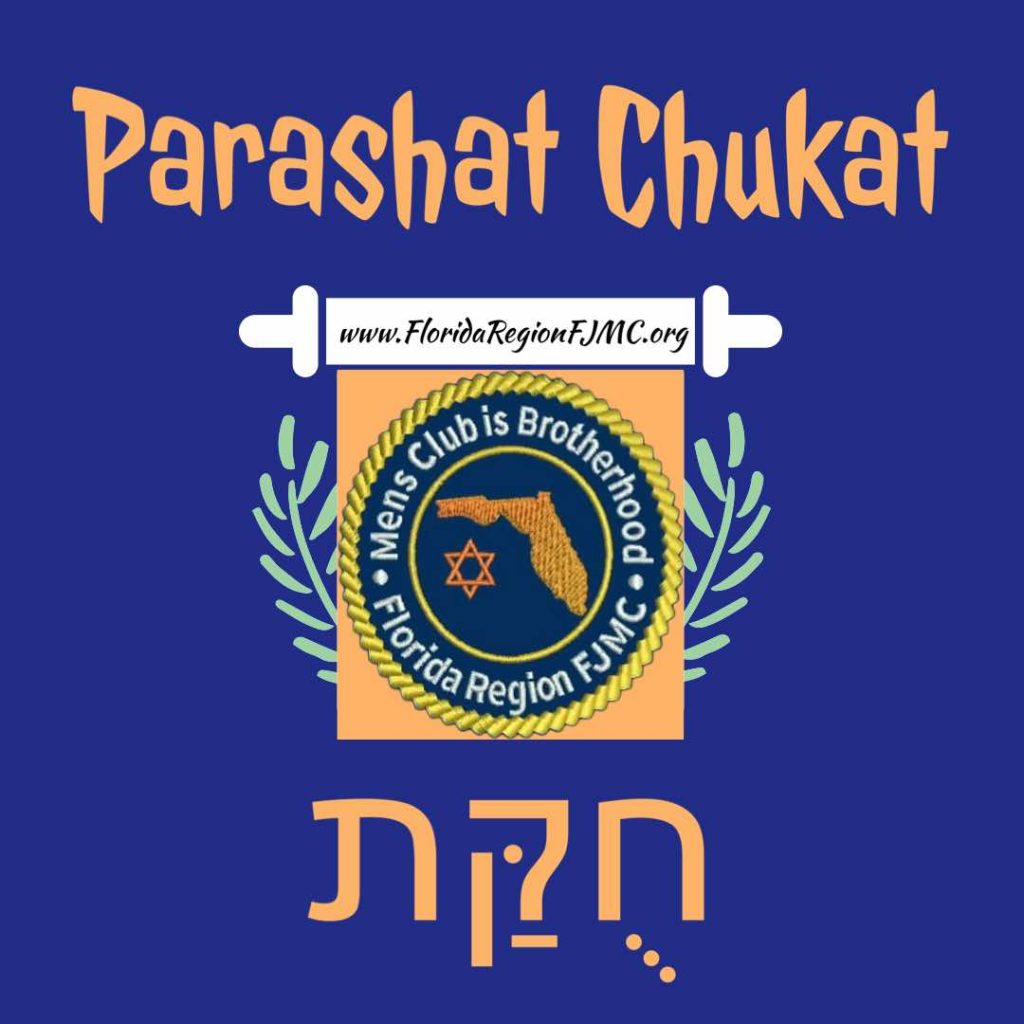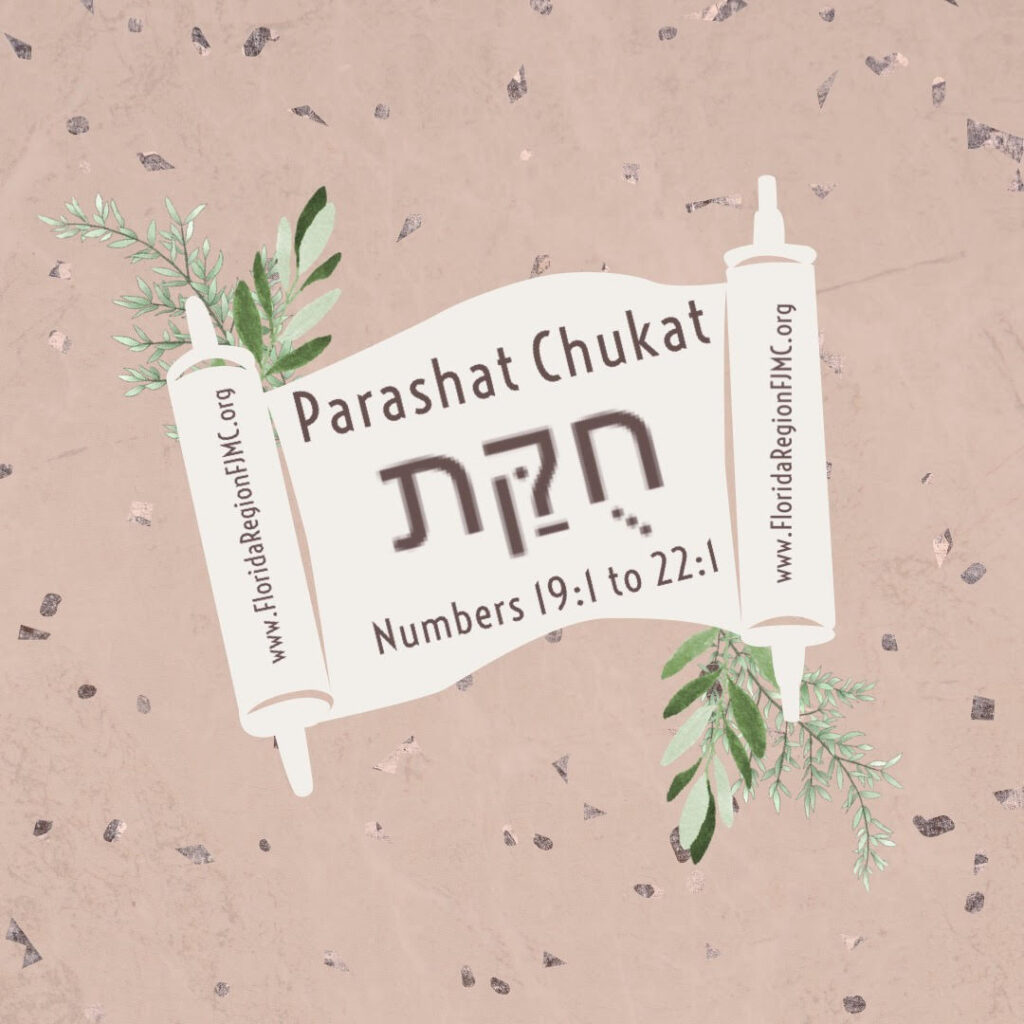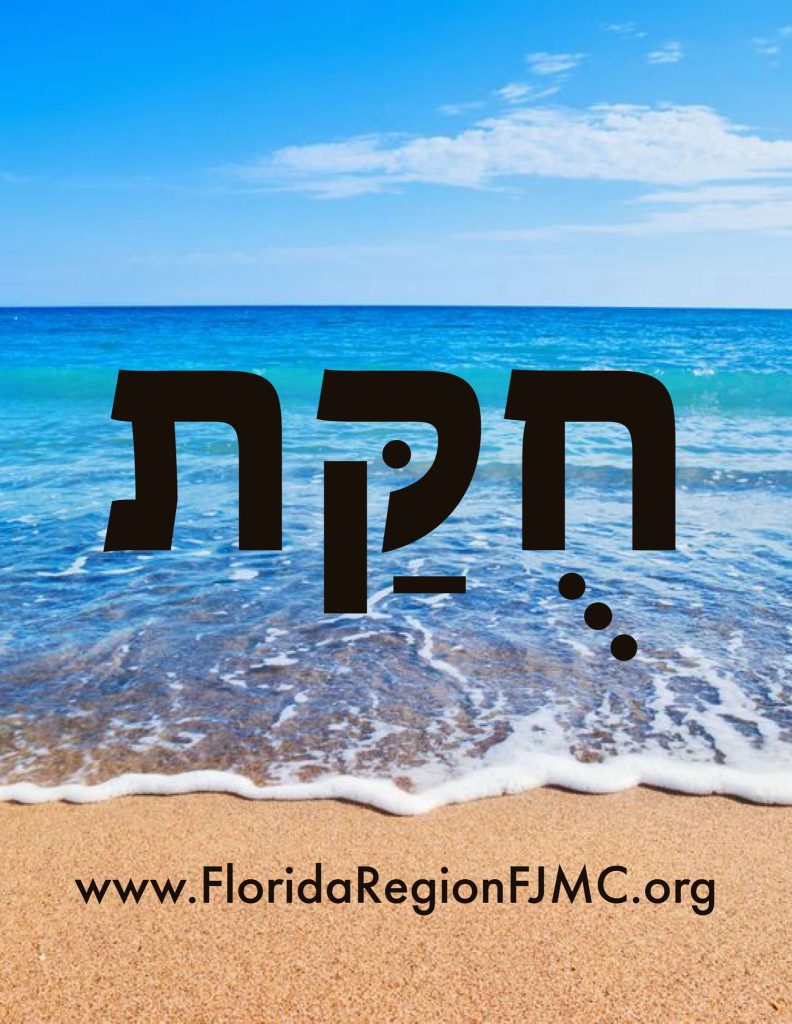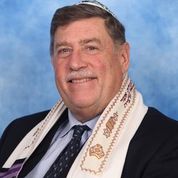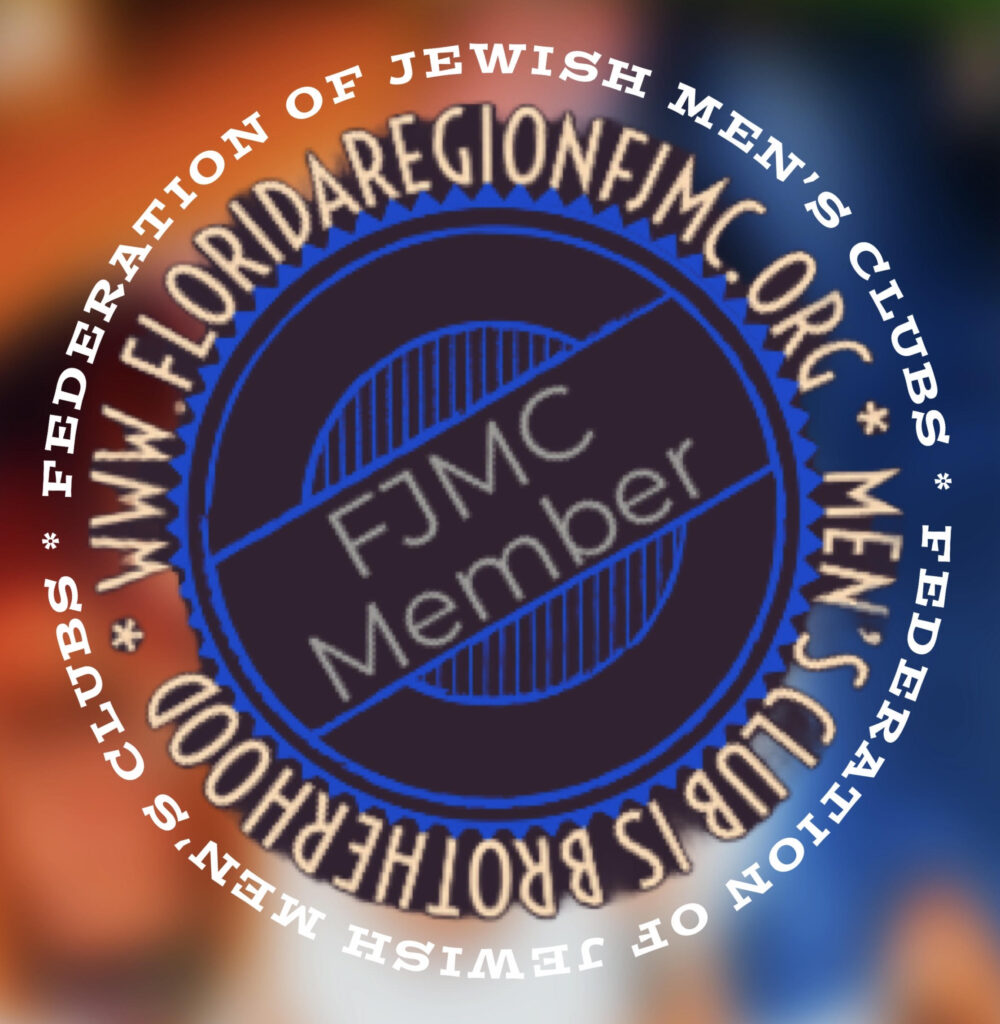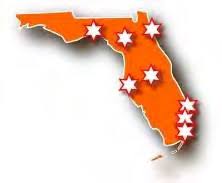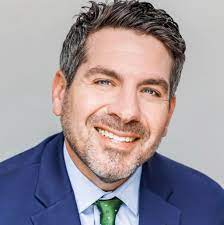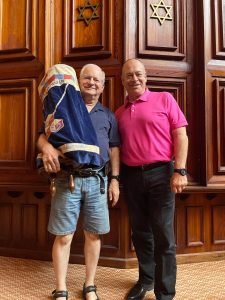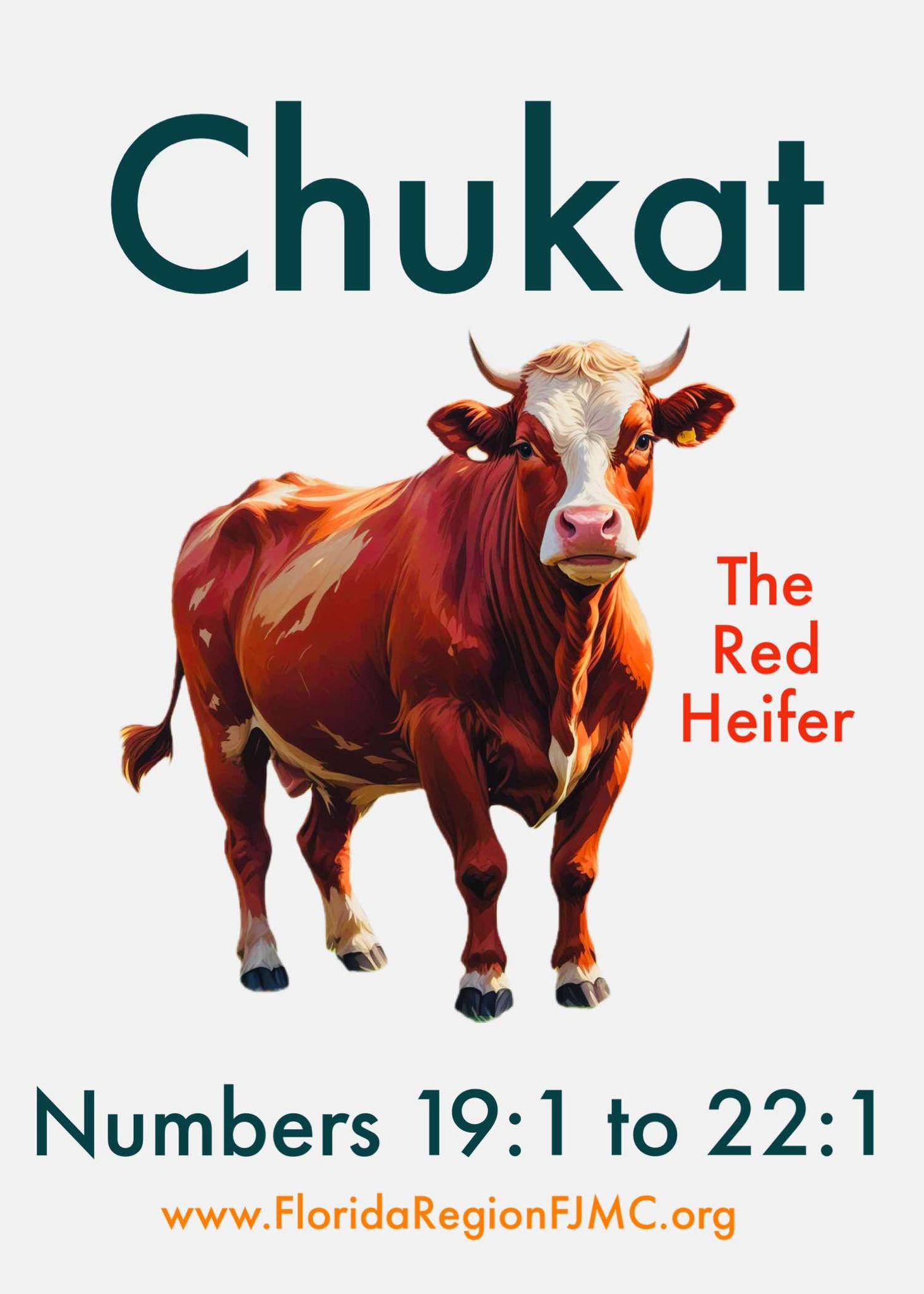
When you Choose Shabbat, you choose to learn that every Shabbat is different and special. This week we read from Parashat Chukat (חֻקַּת), the 39th weekly Torah portion in the annual cycle of Torah readings.
According to Wikipedia, Chukat (חֻקַּת), Numbers 19:1 through 22;1, contains 4,670 Hebrew letters, 1,245 words, 87 verses and makes up 159 lines of the Torah scroll, making it the shortest Torah reading in the Book of Numbers. Chukat (the Hebrew word for “decree”) includes the laws of corpse contamination (tumat hamet) and purification, the deaths of Miriam and Aaron, Moses at the Waters of Meribah and the conquest of Arad, the Amorites and Bashan.
Rabbi Michael D Klein of Temple Torat Emet offers his insights on this week’s Torah reading Chukat for Shabbat, July 5, 2025 aka 9 Tammuz 5785:
“The Torah portion of Chukat usually focuses most of our attention on the Laws of Purification related to the Red Heifer. Often missed, is the narrative of the strife at the waters of Meriba and Massa in the wilderness of Kadesh. Once again, the Children of Israel complain against G-d, and Moses and Aaron’s leadership, because of the lack of water. G-d tells Moses to speak to a specific rock to bring forth water and Moses instead strikes the rock with his staff. The die is cast! G-d decrees that Moses and Aaron will not live to enter the Land of Israel. The Rabbi’s query: Is Moses fate determined by his failure to follow G-d’s specific instructions or because he refers to the People of Israel as “Morim”-rebellious ones? The Sages are quick to point out that righteous people are judged at a higher standard than most and therefore on both counts, Moses receives the severe decree.
The larger and more pragmatic picture is, perhaps, G-d’s realization that a new generation of leaders would need to step up to continue the good deeds of Moses, Aaron, and Miriam. When we read of Miriam’s passing, we are told that no new wells of water ever appear again after her passing. With Aaron’s passing, the people grieve greatly because Aaron was always known as an advocate for peace and a defender of all. When Moses passes, the epitaph given is that Moses spoke to G-d face to face. From these narratives we learn that each person adds to the world a certain measure of holiness and that when they are no longer physically present, we are remembered by what we positively contributed to the world. Likewise, we realize that we are mortal so that we should be cognizant of our positive usage of time to sow as much positivity and love during our lives as we can. This also teaches us to ensure that those who come after us are given the tools to achieve success and are given the values they need to also make the world a better place for all.
G-d assures us that the generations which succeed us will continue our values as long as we strive to live them and teach them to our children and grandchildren. As a Jewish organization, we must assure that we are positive toward our young families and assist them in every way to continue the good works for them and their children who, G-d willing, will one day be the future leaders of our People!”
Questions for Consideration:
- Why does G-d choose the red for the heifer of purification?
- Why does the red heifer commandment appear at this juncture of the Torah?
- How is ritual purification accomplished today without the red heifer?
- Why do the passing of Moses and Aaron both occur on mountains? (Mt. Hor, Mt. Nebo)?
Rabbi Michael D. Klein attended Yeshiva College of South Florida and served as Torah Reader, Hebrew teacher, Chazzan and spiritual leader of various synagogues throughout South Florida. In January 2015 he became Ritual Director, Bnai/Bnot Mitzvah instructor and 7th grade Hebrew instructor for Temple Torat Emet of Boynton Beach. In October 2019 he was accepted into an accelerated track and received his smicha from Yeshiva Adath Wolkowisk and has been the Rabbinic leadership of Temple Torat Emet since August 2020. In September of 2022 he was appointed Rabbinic and Spiritual Advisor of the Florida Region of FJMC.
Choose Shabbat; choose to celebrate, to light candles, sing songs and learn a little Torah.
This moment of Jewish Learning is brought to you by the Florida Region of FJMC International (FJMC). We are part of a confederation of over 200 Jewish Men’s Clubs and Brotherhoods representing over 20,000 members across the United States, Canada, Latin America, and beyond. Learn more about how your Jewish Men’s Club or Brotherhood can affiliate with the FJMC at: https://fjmc.org/for-clubs/affiliating-with-the-fjmc/.
The Florida Region of FJMC serves the needs of affiliated Men’s Clubs and Brotherhoods throughout the State of Florida. Get to know more about the FJMC Florida Region and our growing network of Jewish Men’s Clubs and Brotherhoods at www.floridaregionfjmc.org and please visit and LIKE our Florida Region FJMC Facebook Group at www.facebook.com/FloridaRegionFJMC.
